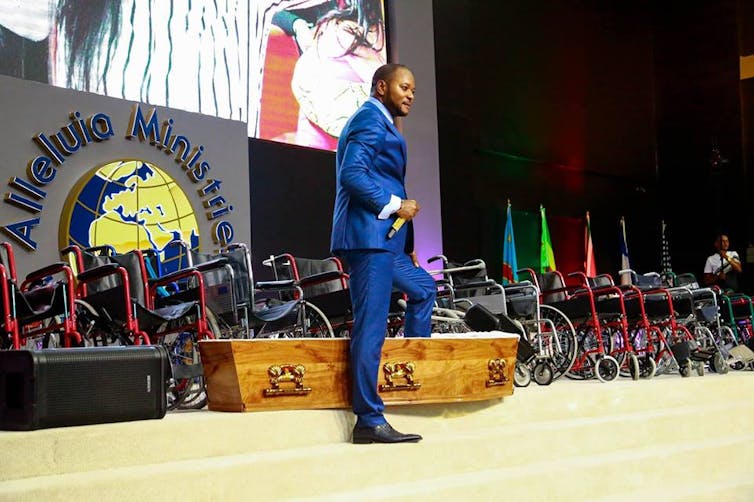
South Africans – like millions of people across the world – are seriously susceptible to religious abuse.
The local media has once again been abuzz with a litany of shocking stories about manipulation, abuse and fraud by pastors. The latest one, a fake “resurrection” made headlines around the world. A video of Pastor Alph Lukau “raising” a man from the dead went viral and even sparked the #ResurrectionChallenge.
Why do South Africans fall for these religious snakeskin oil salesmen (and women)?
One possible reason is that faith continues to play a very significant role in South Africa. In the last household survey over 84% of South Africans indicated that they are Christians. And a 2010 Pew Report found that 74% of South Africans said that religion played an important role in their daily decisions, values and shaping of their morals.
In addition, churches and religious leaders enjoy higher levels of public trust in South African society than either the government or private sector. This is unlike many other modern democracies in the 21st century.
Some suggest that this susceptibility to religious belief is due to the moral and political failures of the state and politicians. Religious leaders and institutions gain trust in situations where the population faces high levels of economic and social vulnerability, as is the daily reality for many South Africans. Religious groups are often the only sources of basic care and hope in many communities.
We believe that South Africans allow charlatan pastors to win their trust, take their money and get them to engage in frightening, and even comical, quasi-religious acts because of a combination of two factors. Many South Africans have high levels of trust in religious leaders. At the same time there’s a great deal of economic need. In situations like this people look to “supernatural” means to solve basic problems. Research on these phenomena in countries such as Brazil and Nigeria shows similar tendencies.
Some answers
People are drawn to what are known as prosperity gospel pastors because they are offered the opportunity of getting out of poverty and becoming rich by means of God’s blessings. South Africans who are losing hope of gaining adequate employment, or dealing with rising debt, see the lavish lifestyles of prosperity gospel pastors is appealing.
The message is that: obedience and sacrificial giving (to the pastor and their church) is the road to wealth.
Second, in a situation in which there is inadequate health care, it isn’t surprising that people turn to “miraculous” healers to find relief from suffering. This phenomenon is not unique to South Africa – it happens in other countries around the world where religion is important and social systems are weak.
How are these unethical leaders and their sectarian communities spotted?
Tell-tale signs
One of the most telling characteristics is an overt and gaudy display of personal wealth. The intention is to extravagantly display the super-abundance of supposed “divine blessing”.
Sadly, the wealth on display is derived by manipulation, even criminality, or excessive and unsustainable debt.
Next, is the tendency towards the supernatural and the spectacular – miracle healings, raising people from the dead, prophesying and sharing visions.
These “miracles” are frequently staged, using actors, psychological tools or technologies. They serve to attract members, and also to establish a hierarchical religious power structure with the pastor at the top.
The veneration and deification of the pastor is another common characteristic. They are presented as a “spiritual elite”, having direct access to God, a special measure of God’s blessing, and particularly powerful spiritual gifts. As God’s “chosen one” these aspects serve both to give the pastors power over their members, but also to shroud them in mystery.
In contemporary religious sociology this is referred to as “religious exceptionalism”. The laws of nature, culture, the religious tradition, the state and morality do not apply to them since they are an “exception”, supposedly by God’s divine choice.
In some instances, these leaders and their communities display cult like tendencies, seeking to isolate their members from regular life and their friends and families, who are portrayed as sinful and evil. It is under such conditions of deep trust, sincere faith, great need, facing spiritual manipulation and isolation, that many of the abuses take place.
Rights and freedom
What should be done to curtail such abuses?
The South African government has sought to regulate religious leaders and communities through the Commission for the Promotion and Protection of the Rights, Cultural, Religious and Linguistic Communities. The commission is attempting to set up standards for conduct, registration and qualification of religious groupings and leaders.
There is some concern that the state-appointed commission will use laws and policies to infringe on the legitimate rights to freedom of religion, and possibly even silence critique of the state.
Also, many of the abuses are not primarily religious or theological in nature. They are covered by civil law that should simply be enacted to protect citizens.
South Africa remains a deeply religious nation. The state and religious leaders and their communities bear a shared responsibility to identify and expose corrupt religious leaders, as well as safeguard citizens against abuse, while maintaining their rights to religious freedom.
Simbarashe Pondani has contributed to this article.
Dion Forster, Head of Department, Systematic Theology and Ecclesiology, Professor in Ethics and Public Theology, Director of the Beyers Naudé Centre for Public Theology, Stellenbosch University
This article is republished from The Conversation under a Creative Commons license. Read the original article.
Sign up for the QuackTrack.org newsletter below!













